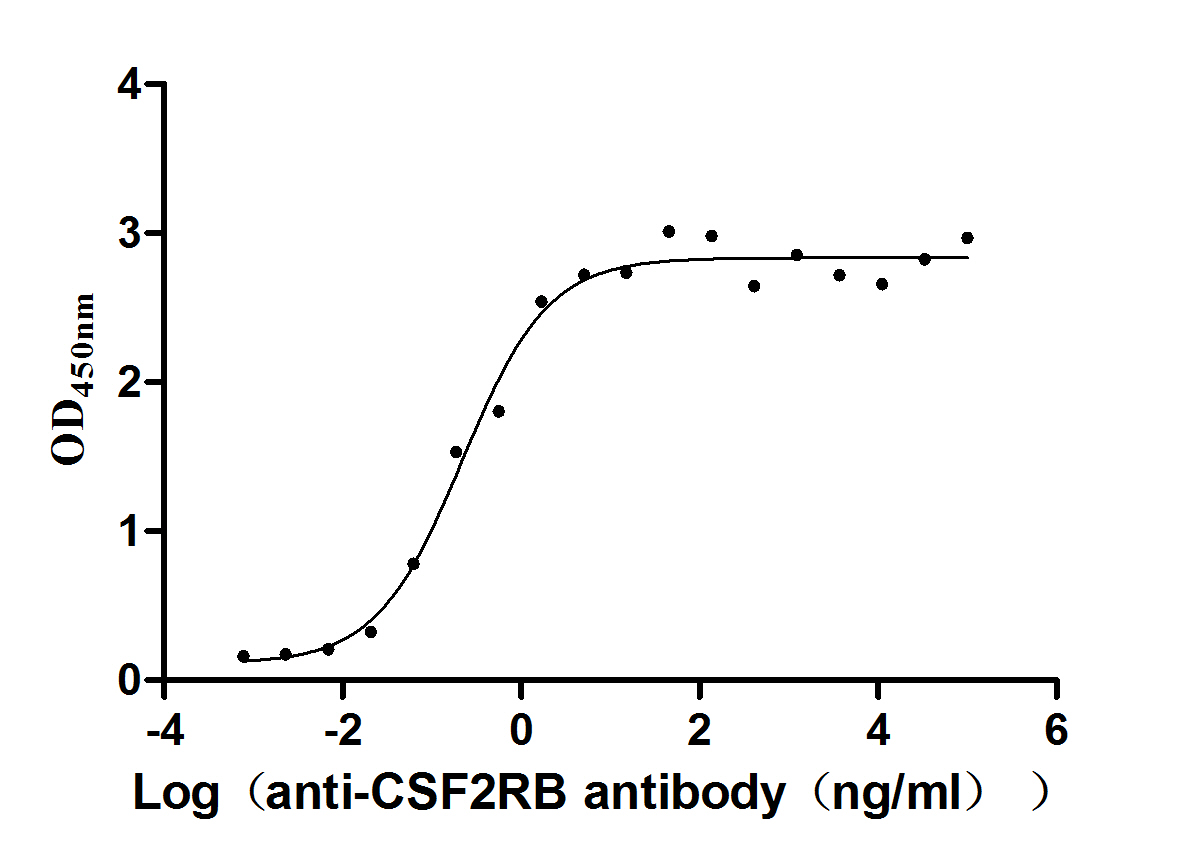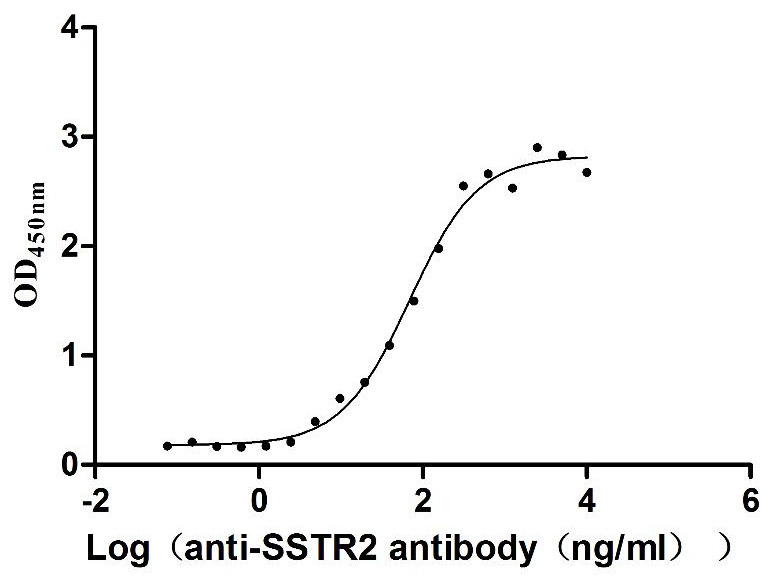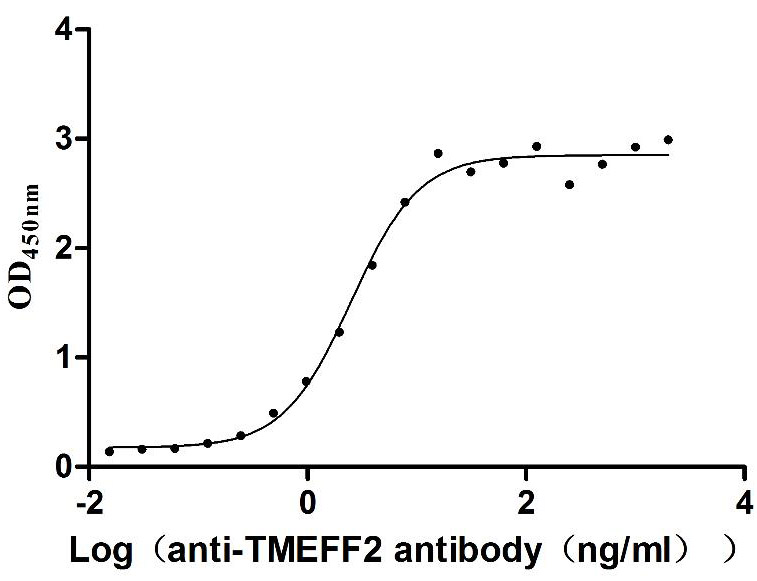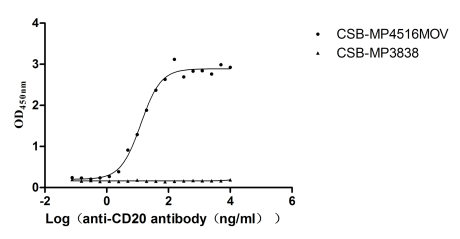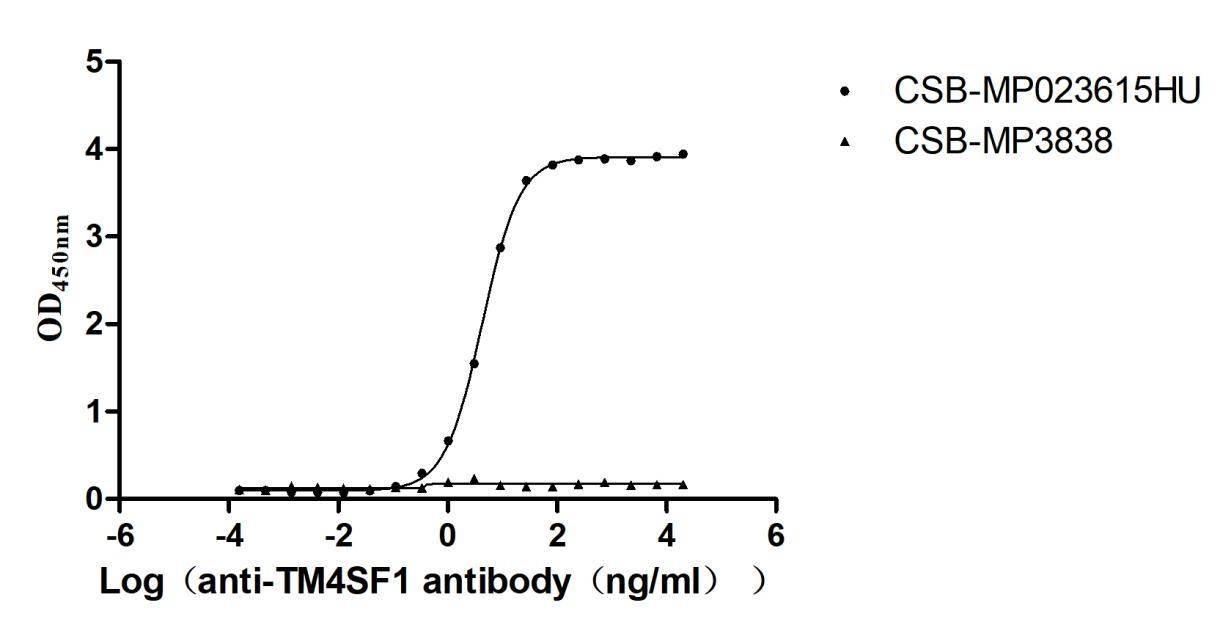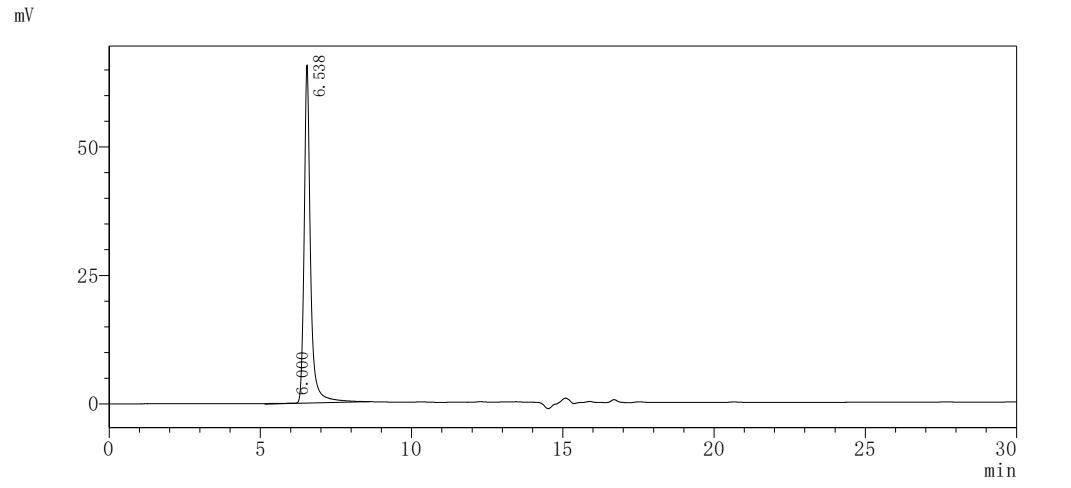Recombinant Mouse Serine/threonine-protein kinase 3 (Stk3)
-
货号:CSB-YP881299MO
-
规格:
-
来源:Yeast
-
其他:
-
货号:CSB-EP881299MO
-
规格:
-
来源:E.coli
-
其他:
-
货号:CSB-EP881299MO-B
-
规格:
-
来源:E.coli
-
共轭:Avi-tag Biotinylated
E. coli biotin ligase (BirA) is highly specific in covalently attaching biotin to the 15 amino acid AviTag peptide. This recombinant protein was biotinylated in vivo by AviTag-BirA technology, which method is BriA catalyzes amide linkage between the biotin and the specific lysine of the AviTag.
-
其他:
-
货号:CSB-BP881299MO
-
规格:
-
来源:Baculovirus
-
其他:
-
货号:CSB-MP881299MO
-
规格:
-
来源:Mammalian cell
-
其他:
产品详情
-
纯度:>85% (SDS-PAGE)
-
基因名:
-
Uniprot No.:
-
别名:Stk3; Mess1; Mst2; Serine/threonine-protein kinase 3; EC 2.7.11.1; Mammalian STE20-like protein kinase 2; MST-2; STE20-like kinase MST2) [Cleaved into: Serine/threonine-protein kinase 3 36kDa subunit; MST2/N); Serine/threonine-protein kinase 3 20kDa subunit; MST2/C)]
-
种属:Mus musculus (Mouse)
-
蛋白长度:full length protein
-
表达区域:1-497
-
氨基酸序列MEQPPASKSK LKKLSEDSLT KQPEEVFDVL EKLGEGSYGS VFKAIHKESG QVVAIKQVPV ESDLQEIIKE ISIMQQCDSP YVVKYYGSYF KNTDLWIVME YCGAGSVSDI IRLRNKTLTE DEIATILKST LKGLEYLHFM RKIHRDIKAG NILLNTEGHA KLADFGVAGQ LTDTMAKRNT VIGTPFWMAP EVIQEIGYNC VADIWSLGIT SIEMAEGKPP YADIHPMRAI FMIPTNPPPT FRKPELWSDD FTDFVKKCLV KSPEQRATAT QLLQHPFIKN AKPVSILRDL IAEAMEIKAK RHEEQQRELE EEEENSDEDE LDSHTMVKTS SESVGTMRAT STMSEGAQTM IEHNSTMLES DLGTMVINSE EEEEEEEEEE EDGTMKRNAT SPQVQRPSFM DYFDKQDFKN KSHENCDQSM REPGPMSNSV FPDNWRVPQD GDFDFLKNLS LEELQMRLKA LDPMMEREIE ELHQRYSAKR QPILDAMDAK KRRQQNF
-
蛋白标签:Tag type will be determined during the manufacturing process.
The tag type will be determined during production process. If you have specified tag type, please tell us and we will develop the specified tag preferentially. -
产品提供形式:Lyophilized powder
Note: We will preferentially ship the format that we have in stock, however, if you have any special requirement for the format, please remark your requirement when placing the order, we will prepare according to your demand. -
复溶:We recommend that this vial be briefly centrifuged prior to opening to bring the contents to the bottom. Please reconstitute protein in deionized sterile water to a concentration of 0.1-1.0 mg/mL.We recommend to add 5-50% of glycerol (final concentration) and aliquot for long-term storage at -20℃/-80℃. Our default final concentration of glycerol is 50%. Customers could use it as reference.
-
储存条件:Store at -20°C/-80°C upon receipt, aliquoting is necessary for mutiple use. Avoid repeated freeze-thaw cycles.
-
保质期:The shelf life is related to many factors, storage state, buffer ingredients, storage temperature and the stability of the protein itself.
Generally, the shelf life of liquid form is 6 months at -20°C/-80°C. The shelf life of lyophilized form is 12 months at -20°C/-80°C. -
货期:Delivery time may differ from different purchasing way or location, please kindly consult your local distributors for specific delivery time.Note: All of our proteins are default shipped with normal blue ice packs, if you request to ship with dry ice, please communicate with us in advance and extra fees will be charged.
-
注意事项:Repeated freezing and thawing is not recommended. Store working aliquots at 4°C for up to one week.
-
Datasheet :Please contact us to get it.
靶点详情
-
功能:Stress-activated, pro-apoptotic kinase which, following caspase-cleavage, enters the nucleus and induces chromatin condensation followed by internucleosomal DNA fragmentation. Key component of the Hippo signaling pathway which plays a pivotal role in organ size control and tumor suppression by restricting proliferation and promoting apoptosis. The core of this pathway is composed of a kinase cascade wherein STK3/MST2 and STK4/MST1, in complex with its regulatory protein SAV1, phosphorylates and activates LATS1/2 in complex with its regulatory protein MOB1, which in turn phosphorylates and inactivates YAP1 oncoprotein and WWTR1/TAZ. Phosphorylation of YAP1 by LATS2 inhibits its translocation into the nucleus to regulate cellular genes important for cell proliferation, cell death, and cell migration. STK3/MST2 and STK4/MST1 are required to repress proliferation of mature hepatocytes, to prevent activation of facultative adult liver stem cells (oval cells), and to inhibit tumor formation. Phosphorylates NKX2-1. Phosphorylates NEK2 and plays a role in centrosome disjunction by regulating the localization of NEK2 to centrosomes, and its ability to phosphorylate CROCC and CEP250. In conjunction with SAV1, activates the transcriptional activity of ESR1 through the modulation of its phosphorylation. Positively regulates RAF1 activation via suppression of the inhibitory phosphorylation of RAF1 on 'Ser-259'. Phosphorylates MOBKL1A and RASSF2. Phosphorylates MOBKL1B on 'Thr-74'. Acts cooperatively with MOBKL1B to activate STK38.
-
基因功能参考文献:
- findings identify Mst1/2 as selective drivers of CD8alpha(+) dendritic cell function by integrating metabolic activity and cytokine signalling, and highlight that the interplay between immune signalling and metabolic reprogramming underlies the unique functions of dendritic cell subsets PMID: 29849151
- It is involved in apoptosis and serine/threonine kinase 3 (STK3) is a recently identified caspase-6 substrate. PMID: 27552481
- Using a standard two-thirds partial hepatectomy (PH) model in young and aged mice, the activity of the core kinases MST1 and LATS1 increased during the early hypertrophic phase and returned to steady state levels in the proliferative phase, coinciding with activation of YAP1 target genes and hepatocyte proliferation. PMID: 27940445
- Studies indicate that Hippo (Hpo; MST1/2 in mammals) signaling pathway plays a central role in the cell fate-specification process. PMID: 25986053
- Mst2 is involved in bone homeostasis, functioning as a reciprocal regulator of osteoclast and osteoblast differentiation through the NF-kappaB pathway PMID: 25761670
- the TLR-Mst1-Mst2-Rac signaling axis is critical for effective phagosome-mitochondrion function and bactericidal activity PMID: 26414765
- Hippo signaling is an endogenous repressor of adult cardiomyocyte renewal and regeneration. PMID: 24255096
- These data indicate that that inhibition of mammalian sterile 20-like kinase 1 rescued cardiac fibrosis and myocardial dysfunction in chronic beta1-adrenergic receptor stimulation-induced cardiomyopathy PMID: 25600225
- Phosphorylation of LC3 by the STK3 and STK4 is essential for autophagy. PMID: 25544559
- These results identify MST2, not MST1, as a critical regulator of caspase-mediated photoreceptor cell death in the detached retina and indicate its potential as a future neuroprotection target. PMID: 24874741
- results reveal a novel role of Mst2 in stress-dependent cardiac hypertrophy and remodeling in the adult mouse and likely human heart PMID: 25035424
- Mst1/2 regulate placental development by control of trophoblast cell differentiation and labyrinthine vasculature at midgestation and Mst1/2 control labyrinth morphogenesis in trophoblast- and fetal endothelial-dependent manners. PMID: 24595170
- results showed that Mst1/Mst2 are required for proper cardiac lineage cell development and teratoma formation. PMID: 24224013
- these findings indicate that Mst1/2 are important for controlling Treg development and preventing autoimmunity in mice, but also shed new light on our understanding of Mst1 deficiency-mediated human immunodeficiency syndrome. PMID: 24453252
- MST2 maintains postnatal pancreatic acinar differentiation in mice. PMID: 23454691
- Mst1/2 kinases are critical for orchestration of transcription factors involved in surfactant protein homeostasis and prevention of respiratory distress syndrome, and phosphorylate Foxa2, regulating pneumocyte maturation and surfactant protein expression PMID: 23620511
- Mst1 and Mst2 kinases control Rho GTPase activation and the migratory responses of single positive thymocytes. PMID: 22412158
- Differentiation of 3T3-L1 cells was augmented by MST2 and SAV1 expression and inhibited by knockdown of MST1/2 or SAV1. PMID: 22292086
- The small number of tumors with co-expression of mutant K-Ras and MST2 has elevated apoptosis rates. PMID: 22195963
- This cell morphology (stress-fiber)-mediated mechanism probably cooperates with a cell-cell contact (adhesion)-mediated mechanism involving the Hippo pathway to achieve density-dependent control of cell proliferation. PMID: 21831922
- data uncover a nuclear interaction between Hippo and Wnt signaling that restricts cardiomyocyte proliferation and controls heart size. PMID: 21512031
- show that Mst1 and Mst2 play redundant roles, and removal of both resulted in early lethality in mouse embryos. PMID: 20080598
- show using a conditional allele of sav1, that an adaptor that potentiates mst1 and mst2 activity is likewise required to suppress growth in the mature liver and to prevent tumor formation. PMID: 20080689
- Phosphorylation and dimerization regulate nucleocytoplasmic shuttling of mammalian STE20-like kinase (MST). PMID: 11805089
- proteomic analysis of Raf-1 signaling complexes was used to show that Raf-1 counteracts apoptosis by suppressing the activation of mammalian sterile 20-like kinase (MST2) PMID: 15618521
- MST1 and MST2 are activated in mitosis and catalyze the mitotic phosphorylation of MOBKL1A/MOBKL1B, which is sufficient to inhibit proliferation through actions at several points in the cell cycle. PMID: 18328708
- indicate that both Mst1 and Mst2 kinases play essential roles in early mouse development, regulating placental development, vascular patterning, primitive hematopoiesis, and cell proliferation and survival. PMID: 19786569
显示更多
收起更多
-
亚细胞定位:Cytoplasm. Nucleus.
-
蛋白家族:Protein kinase superfamily, STE Ser/Thr protein kinase family, STE20 subfamily
-
数据库链接:
KEGG: mmu:56274
STRING: 10090.ENSMUSP00000018476
UniGene: Mm.262330
Most popular with customers
-
Recombinant Human Cytokine receptor common subunit beta (CSF2RB), partial (Active)
Express system: Mammalian cell
Species: Homo sapiens (Human)
-
Recombinant Human Somatostatin receptor type 2 (SSTR2)-VLPs (Active)
Express system: Mammalian cell
Species: Homo sapiens (Human)
-
Recombinant Human Tomoregulin-2 (TMEFF2), partial (Active)
Express system: Mammalian cell
Species: Homo sapiens (Human)
-
Recombinant Macaca fascicularis Membrane spanning 4-domains A1 (MS4A1)-VLPs (Active)
Express system: Mammalian cell
Species: Macaca fascicularis (Crab-eating macaque) (Cynomolgus monkey)
-
Recombinant Human Myosin regulatory light chain 12A (MYL12A) (Active)
Express system: E.coli
Species: Homo sapiens (Human)
-
Recombinant Human Transmembrane 4 L6 family member 1(TM4SF1)-VLPs (Active)
Express system: Mammalian cell
Species: Homo sapiens (Human)
-
Recombinant Human C-C chemokine receptor type 9 (CCR9)-VLPs (Active)
Express system: Mammalian cell
Species: Homo sapiens (Human)


